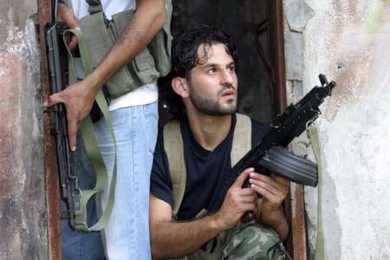 BEIRUT, 1 March (IRIN) – Young Lebanese, Palestinians and Sudanese want tougher gun control regulations, a survey by a group of NGOs revealed. The findings of the study, which was conducted over the last six months by the Middle East North Africa Network on Small Arms (MENSAA), an umbrella group of Arab NGOs concerned with the misuse and proliferation of illicit small arms and light weapons, were released on Tuesday in Beirut.
BEIRUT, 1 March (IRIN) – Young Lebanese, Palestinians and Sudanese want tougher gun control regulations, a survey by a group of NGOs revealed. The findings of the study, which was conducted over the last six months by the Middle East North Africa Network on Small Arms (MENSAA), an umbrella group of Arab NGOs concerned with the misuse and proliferation of illicit small arms and light weapons, were released on Tuesday in Beirut.
MENSAA similarly studied Yemen and Jordan last year, and there are plans to broaden the study to include Iraq and Syria later this year. Although most participants wanted tougher gun laws, however, they also revealed a mistrust or lack of confidence in their respective governments. The need for personal security where rule of law had broken down was found to be a main motivation behind private gun ownership. Fear of instability was another factor, the study found. "Most people appear not to want to possess arms, but feel they are forced to by existing circumstances, or feel they should continue to keep them, just in case conflict flares up," the study noted. Fadi Abi Allam of the Permanent Peace Movement Lebanese NGO, which conducted the Lebanese surveys, said about two million people were believed to possess guns in Lebanon, which has a population of nearly four million. Civil war tore Lebanon apart from 1975-1990, and the country remains riven by sectarian differences. Lebanese survey participants blamed the high number of private weapons to fears of instability, given the country’s recent history. Thirty-seven percent of Lebanese questioned said they owned one gun; 22 percent said they possessed three or more. Survey participants, however, differentiated between guns held for reasons of national security, political resistance or for other uses, such as hunting. Under the Taif agreement that ended Lebanon’s civil war in 1990, only political/religious group Hizbollah was allowed to maintain its weapons to fight Israel’s continued occupation of the south. "As for the other militias in Lebanon, they were disarmed of their heavy and medium weapons, but not the light ones," Abi Allam said. Nevertheless, Hizbollah has come under increasing international pressure to disarm after Israeli troops withdrew from most of the occupation zone in 2000. UN Security Council resolution 1559, adopted in September 2004, calls on all armed militias in Lebanon to give up their weapons. The study further found that extreme poverty, political insecurity and the absence of the rule of law have led to prevailing gun cultures, especially in the Palestinian territories and in areas of Sudan. Palestinians in the West Bank and Gaza have suffered conflict with Israel for decades, and have lived under occupation ever since the Jewish state seized the territories in 1967. While Israel pulled out of the Gaza Strip last year, the territory’s borders are still controlled by Tel Aviv, and the area remains poor and unstable. According to the Bulletin of Atomic Scientists, a publication devoted to international security issues, there are some 10,000 to 15,000 guns in the Palestinian territories, ranging from World War II-vintage guns to modern AK-47 assault rifles. The area of Al-Haj Yousif near Khartoum, meanwhile, has a large number of internally displaced persons who have escaped either a long-running civil war in the south that ended in 2005 or the conflict in Darfur, which broke out in 2003, the report said. Unemployment stands at 40 percent in the district, although figures for gun ownership remain difficult to ascertain but is believed to be high. Among Sudanese survey participants, high crime rates were cited as the main reason for owning guns. "However, most respondents agreed that the most common use of firearms in Al-Haj Yousif is related to marriage celebrations where ammunition is fired, and in many cases the result is fatal," the report pointed out.



